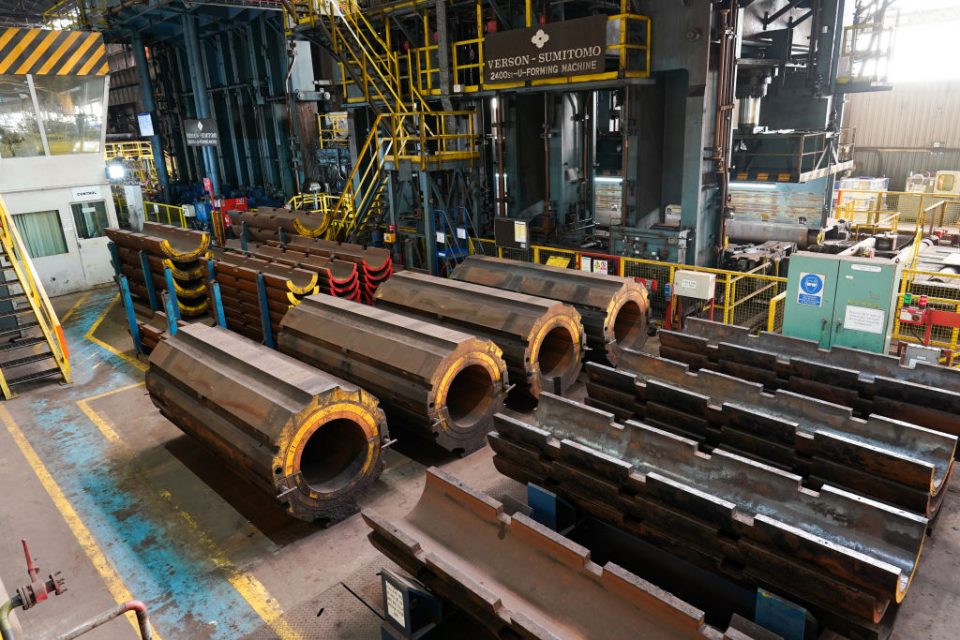Kwasi Kwarteng: Nationalisation is least likely route for Liberty Steel
Angharad Carrick

Angharad Carrick

Liberty Steel is unlikely to be nationalised despite pleas from its owner GFG Alliance. (Getty Images)
The UK is considering all options for Liberty Steel but nationalisation is the least likely route, the business secretary has told MPs.
In March Sanjev Gupta’s company GFG Alliance, which owns Liberty Steel, asked the government for a bailout of as much as £170m to avert collapse.
The insolvency of Greensill Capital, which was among GFG’s biggest lenders, has left it scrambling for cash.
Read more: Liberty Steel to sell Stocksbridge site as Gupta seeks to pay off creditors
Today, business secretary Kwasi Kwarteng told MPs on the business select committee that the UK was exploring all options for Liberty Steel but nationalisation was the least likely option.
“The assets fundamentally are good assets… Nationalisation is an extreme occurrence which is unlikely to happen, quite frankly. My view has been vindicated by the fact the assets are for sale,” Kwarteng said.
On Monday the UK’s third largest steel maker announced plans to sell off its Stocksbirdge steel plant as part of a restructuring plan to allow it to pay back Credit Suisse, which lost more than £1bn when Greensill collapsed.
Kwarteng said he “cautiously welcome[d] progress being made to secure the future of Liberty Steel” and would monitor developments closely.
It was also revealed on Monday that the investigation into Wyelands, the retail bank owned by Gupta, involved the National Crime Agency and the SFO.
Read more: Liberty Steel breached £18m loan with Metro Bank – report
It comes just weeks after the SFO announced a probe into suspected fraud and money laundering at GFG.
Kwarteng saidthe issues surrounding GFG had factored into his own decision-making on the question of nationalisation.
“The opacity of their corporate governance and difficulty to understand the full nature of their business prevented me and my officials from giving them taxpayers’ money, and dare I say it, we were vindicated in our approach,” he said today.
“The £170m was a big ask on the British taxpayer and I had doubts… if a UK government gave them money it wasn’t clear to me that this money would stay in the UK,” he added.
The UK is considering all options for Liberty Steel but nationalisation is the least likely route, the business secretary has told MPs.
In March Sanjev Gupta’s company GFG Alliance, which owns Liberty Steel, asked the government for a bailout of as much as £170m to avert collapse.
The insolvency of Greensill Capital, which was among GFG’s biggest lenders, has left it scrambling for cash.
Read more: Liberty Steel to sell Stocksbridge site as Gupta seeks to pay off creditors
Today, business secretary Kwasi Kwarteng told MPs on the business select committee that the UK was exploring all options for Liberty Steel but nationalisation was the least likely option.
“The assets fundamentally are good assets… Nationalisation is an extreme occurrence which is unlikely to happen, quite frankly. My view has been vindicated by the fact the assets are for sale,” Kwarteng said.
On Monday the UK’s third largest steel maker announced plans to sell off its Stocksbirdge steel plant as part of a restructuring plan to allow it to pay back Credit Suisse, which lost more than £1bn when Greensill collapsed.
Kwarteng said he “cautiously welcome[d] progress being made to secure the future of Liberty Steel” and would monitor developments closely.
It was also revealed on Monday that the investigation into Wyelands, the retail bank owned by Gupta, involved the National Crime Agency and the SFO.
Read more: Liberty Steel breached £18m loan with Metro Bank – report
It comes just weeks after the SFO announced a probe into suspected fraud and money laundering at GFG.
Kwarteng saidthe issues surrounding GFG had factored into his own decision-making on the question of nationalisation.
“The opacity of their corporate governance and difficulty to understand the full nature of their business prevented me and my officials from giving them taxpayers’ money, and dare I say it, we were vindicated in our approach,” he said today.
“The £170m was a big ask on the British taxpayer and I had doubts… if a UK government gave them money it wasn’t clear to me that this money would stay in the UK,” he added.
No comments:
Post a Comment